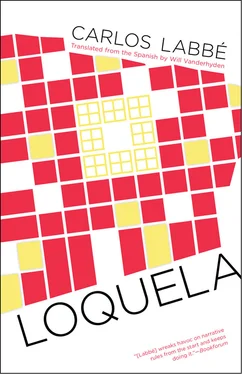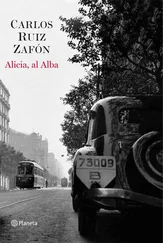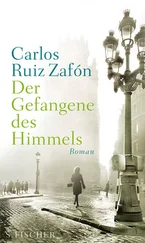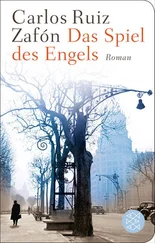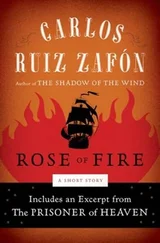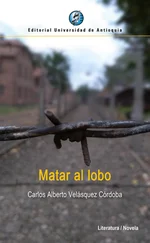I’ve been reading nonstop. Coincidences disturb me and stimulate me and give me faith (my pretentiousness is unbearable today). The question mark of Neutria, my doubt is illuminated the minute I start doing research for my thesis on Onetti. The Uruguayan invented a metropolis, Santa María, inspired by Faulkner. (García Márquez did too, but I ignored him.) I should read more Onetti, not just out of academic responsibility. (But why does the existence of Neutria matter to me, why does it matter if Violeta wrote a novel or a chronicle? Onetti himself has ceased to exist; I don’t recall seeing his face in any photo, I don’t know anything about his life except that he died. Onetti could have easily been the pseudonym, the heteronym, the alias of another writer; the literary identity of a journalist working in Santa María. No matter what, there will always be someone who empirically proves the impossible. Without a doubt, right now a detective or a visiting judge is trying to clear up the actual facts of Violeta Drago’s death: according to the file she was a maniac with pen and paper, but all paths inevitably lead to Neutria, to the fictional address, because in Santiago there’s no evidence and no suspects.) Saturday I almost dialed Alicia’s number to ask her about Violeta’s city. Sooner or later she’ll make me offer an opinion, a hypothesis about her friend’s death, because clearly she didn’t give me the notebooks for my own enjoyment. And here I am, seeing ulterior motives in Alicia. (But what’s wrong with that? Carlos has always enjoyed detective novels.)
On Thursday afternoon I told C about my anxiety. I was lying in bed, worn out. I didn’t want to see anybody I knew, the mere idea of picking up the phone made me want to puke. But I desperately needed to get out of my apartment and to speak. For a moment, I wished there were a place in Santiago where strangers could sit on benches and have conversations without having to interact in what we call social relations. A pretty little plaza with trees, streetlamps, and life. Where? Nowhere, dreaming, you knew it right away. As if La Cañada or La Alameda de las Delicias still existed, as if people still walked arm-in-arm, she said, as if we were of an age to go sit in the Plaza de Armas and watch the people go walking by. Then she told me about a place in Spain, Alicante, San Sebastián, like she was remembering it herself. A place where old people go to retire; there, facing the sea, they have set out hundreds of chairs, and when the weather is nice, they can sit down wherever they like to watch the waves come and go, to deliberately converse with anyone who is nearby. Imagine that in Chile such a place existed, a place called Neutria.

August 27 th
3:10 A.M.
Before entering my room I sense an odor, a foul, rancid odor. How is it possible? My own body disturbs me, I can’t even begin to imagine the displeasure I provoke. Ah, please, forgive my indelicacy in these notes. As might be expected, I read and read all week long. I was hoping to give fate a chance, what chance! Look at me, reading the weekly horoscope — a habit I no doubt retain from afternoons spent with J — where it says that Thursday is a special day: love moves into the phase of compromise. Alicia is so far away, I cannot see her and yet I evoke her, even now. (Why don’t I just use her initials like I do with everyone else, why does she have the luck of being the woman whom I name while writing this diary, the only one not victim of my lethal capriciousness?)
The horrible thing is that reading doesn’t make me calm; I spent the afternoon thinking about Donoso, about Coronation and its protagonist who doesn’t live life, but just reflects on it. (Do I want to be him?) I regret getting drunk so easily, just because C is celebrating her birthday, I am going to reject Alicia’s invitation to dance. Too many questions await me back at my desk. Yesterday, coming back from playing soccer, E’s friend’s car turned a corner and, instead of asking them to drop me off, I let out an absurd laugh. A few blocks later, realizing we’d passed my address, they stopped. They asked me why I hadn’t said anything, I said I didn’t know.
I think about corruption, about indecency, and about the unfathomable. At C’s party, J was dancing, talking, and laughing — happy. I know I didn’t deserve — nor did she — an explanation (or even a greeting), but we were both waiting for one. That’s why, in these first days of spring, I take up the contradiction of writing this diary, revelation and concealment, the resplendent whiteness of the page and the hope that if I play enough soccer, if I write and write, I’ll be able to distance myself from the terror that after reading me, no one will ever want to see me. Give me shelter. I can’t go on.

August 27 th
12:00 P.M.
I want to explain myself but I am not, I’m not capable. My head hurts, my vision is spinning, and I’m nauseated. I felt deranged reading what I wrote last night with the last of my strength, its meaning escapes me now and I don’t understand why I repeat the same words over and over: my re-creation of Neutria has failed. I wanted to arrive at that city, using the same methods as Violeta; alcoholic excess took me elsewhere, somewhere far wetter and more fateful than paper. Now my body is paying for that compulsion, if I’m brave enough to sit down with a pen I’ll explain later.
While I made the bed and vacuumed the hallway, I thought about F. Peréz’s (or Roland Barthes’s) explanatory sentences regarding his article on Couve: he doesn’t structure the text as a daily diary for rhetorical authenticity, not at all, rather he does so out of a desire to construct a discourse with marks of the process by which it was written. I refuse to let myself agree, I write this way because I lack the indifference necessary to construct a narrative object that’s alien to me, even if only in appearance. I admire this in Couve, Donoso, Balzac, Henry James, all those who, lashed by the storm, are able to cling to a third person, to produce dialogues without the intervention of the I, to describe, to divide themselves into chapters. As if in the middle of his suffering, in the moment they activated the electric chair, the condemned man ran through his mind a fairytale he’d composed in his cell, and he felt no pain, because his head was so occupied with finding the precise perspective from which to approach the final scene, when the protagonist finds the girl’s body. (“I regret nothing” is the only thing that Violeta wrote, every day during the second half of July; the days of August were left blank, and then, furiously, she recounts a dream similar to one I had, if I’m able I’ll write about it later.) Is that not, perhaps, what Violeta is doing, inventing a false city to escape from the days of Santiago, from the fact that there’s someone stalking her with letters and phone calls, following her to class, perhaps not just one someone, but several? The doorbell is ringing.

August 27 th
7:56 P.M.
“Just like dogs, I experience that need for the infinite.” Here in Santiago, nobody barks, and even if I heard barking I wouldn’t be able to go see what was going on, who is biting what. I wish I were Lautréamont, I wish I could write just one sentence without paraphrasing, I wish I’d been born before the printing press, and that I didn’t speak with someone else’s voice whenever I want to make myself understood, to say what it is I imagine. (I’m going up to Alicia during a break, ready to blurt out what’s eating me up inside: I love her. She looks at me stiffly, even though these days the spring air is sweet and lifts spirits, she doesn’t smile at me. Just arcs her eyebrows. I open my mouth: “Like the dogs, I thirst for the infinite.” Her surprise is barely visible. I don’t get it, what’re you trying to say. I don’t know, I answer, quieter all the time. But that’s the sentence.)
Читать дальше
